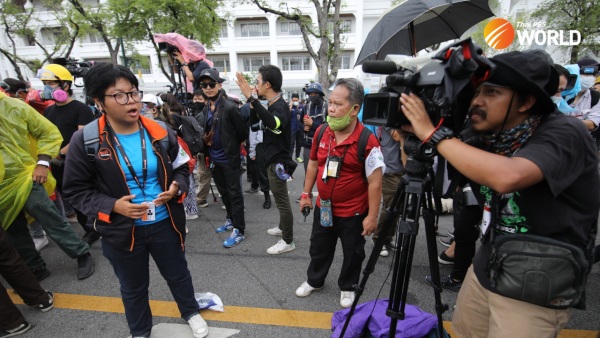For many, the bill on media ethics and professional standards, which was hotly debated in a joint parliamentary session on Tuesday, may be something that has come out of the blue. In fact, it was something long in the making.
It’s also a stark reminder that, even though the National Council for Peace an Order (NCPO), the military junta which seized power in 2014, is no longer around, its legacy is far from being erased.
After toppling the Yingluck government eight years ago, the junta initiated an ambitious reform agenda, which it claimed was needed to address the country’s ills. One of its targets was the media.
“Media reform” suddenly became one of the so-called “priority items” on the agenda of the junta, which made it clear that it wanted nothing short of a statutory instrument to regulate the media. In its eyes, the system of outright self-regulation, as always practiced by the Thai media, no long sufficed.
Different versions of a media ethics bill were subsequently drafted. Media practitioners and media professional organisations were divided over how much they wanted to get involved in the process. Some chose to stay away, while others believed that their participation would help resist domination by those who wanted to roll back press freedom.
The final version of the bill was adopted and submitted to the previous Prayut administration in 2018, but was not formally approved by the current Cabinet until January last year. It took another year before it was finally taken up by Parliament.
It was Gen Prawit Wongsuwan who proposed the bill to Parliament in September last year, in his capacity as caretaker prime minister, classifying it as a “priority item”, which requires a joint parliamentary sitting to fast-track its passage.
The bill fits in with a section of the current Constitution, drafted while the junta was still in power, which is devoted exclusively to “national reforms” that cover a wide range of areas, from politics and the judiciary to education and the media.
What is the bill all about?
At the heart of the bill is the so-called Media Professional Ethics Council, to be set up to protect press freedom and to oversee media practitioners and media organisations, to ensure that they abide by the professional code of ethics. The council will establish and enforce ethical and professional standards for the media, handle complaints from members of the public and provide mechanisms for resolving disputes between the media and their audiences.
Defenders of the bill stress that its fundamental principle is to ensure that the media operate in a responsible and accountable manner, serve the public interest and uphold freedom of expression.
The council will be administered by an 11-member board,comprising representatives chosen from the media, academia, human rights and consumer protection organisations. It will be financed with a seed fund and subsidies from the government and, on a more permanent basis, a minimum of 25 million baht in annual funding from the National Broadcasting and Telecommunications Commission (NBTC).
Existing and future media professional organisations can register with the council in return for funding support for professional training and capacity building, as well as participation in media profession-related activities. They will also be entitled to nominate representatives to sit on the council.
Once they are registered, the media professional organisations are required to enforce the professional code of ethics among their members.
This is the first time that there are attempts to regulate the media with a statutory instrument. The bill does stop short of giving the council the power to directly penalise media practitioners or organisations found guilty of breaching the professional code of ethics.
The bill essentially relies on social and peer pressure to make the media accountable. The consequences for breaching media ethics range from being served with a warning and being put on probation to being publicly censured. In a way, the bill still retains elements of self-regulation for the industry.
Critics, including journalists and media professional organisations, believe that the bill is not compatible with the current media landscape, which is far different from the time when it was drafted. They said the proliferation of social media makes regulation of the media almost impossible.
Debating against the bill on Tuesday, opposition MPs expressed fears that the bill would open the way for those in power to interfere with the media and, by receiving state funding, the media would be subject to influence from the government.
Some of the MPs are also skeptical of the provisional clause in the bill which specifies that the initial board of the media ethics council includes the director general of the Public Relations Department and the secretary general of NBTC, as well as representatives of the media whose nomination requires the Cabinet’s endorsement. They expressed concerns that it would open the council to political intervention.
Defending the bill on behalf of the Cabinet, Minister of the Prime Minister’s Office Thanakorn Wangboonkongchana denied charges that the government intends to use it as a tool to stifle press freedom. He said the bill is essentially designed to promote media ethics and press freedom.
A number of senators also came to the defence of the bill, stressing the need for the media to be more responsible and to be held more accountable.
Attempts to push the bill through with a vote fell through, however, after Parliament President Chuan Leekpai had to order the meeting adjourned as there was no quorum present.
Since the current and the last session of the present Parliament is due to end on March 1st, there is a big question mark over whether the bill would be brought back for a vote.
By Thepchai Yong
THE FIRST E-COMMERCE SPECIALIZED ON TRUFFLES AND TRUFFLE PRODUCTS – TRUFFLEAT.IT

